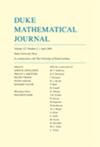稀疏多项式序列的素数
IF 3
1区 数学
Q1 MATHEMATICS
引用次数: 4
摘要
素数理论中某些棘手问题的一个显著特征是底层序列的稀疏性。基于在稀疏多项式序列中寻找素数的一般问题,我们给出了形状为x + 2y且y较小的素数的估计。本文章由计算机程序翻译,如有差异,请以英文原文为准。
Prime values of a sparse polynomial sequence
A distinguishing feature of certain intractable problems in prime number theory is the sparsity of the underlying sequence. Motivated by the general problem of finding primes in sparse polynomial sequences, we give an estimate for the number of primes of the shape x + 2y where y is small.
求助全文
通过发布文献求助,成功后即可免费获取论文全文。
去求助
来源期刊
CiteScore
3.40
自引率
0.00%
发文量
61
审稿时长
6-12 weeks
期刊介绍:
Information not localized

 求助内容:
求助内容: 应助结果提醒方式:
应助结果提醒方式:


